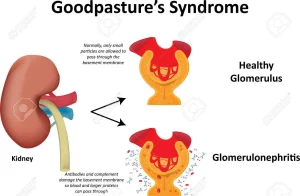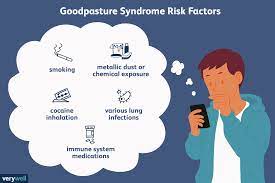Goodpasture syndrome is a group of acute illnesses that affects the lungs and kidneys. It involves an autoimmune disorder. Normally, the immune system makes antibodies to fight off germs. But with Goodpasture syndrome, the immune system mistakenly makes antibodies that attack the lungs and kidneys. This condition can quickly progress to an inflammation of the kidneys (glomerulonephritis) and kidney failure. It can be fatal if not quickly diagnosed and treated.
This disease most often occurs in people ages 20 to 30 or those older than age 60. It is more common in men. In some cases, bleeding in the lungs may occur. In most cases, this disease does not cause lasting damage to the lungs. But kidney damage may be long-lasting. If the kidneys fail, kidney transplant or dialysis may be needed.
Etiology of this Goodpasture Syndrome:
Medical experts are not certain what causes this disease. It can run in families, so genetics may play a role. Or the disease may occur because of a combination of other factors. These include exposure to certain chemicals, such as dry cleaning chemicals or the weed killer Paraquat. Viral infections, smoking, or medicines may also play a role.
Signs and Symptoms of Goodpasture Syndrome:
- Lack of energy or tiring easily (fatigue)
- Nausea
- Trouble breathing
- Pale skin
As the condition progresses, other symptoms may occur, including:
- Coughing up blood
- Burning feeling when urinating
Over time, symptoms of kidney involvement may occur, including:
- Small amounts of blood in the urine (hematuria)
- Protein in the urine (proteinuria)
The symptoms of Goodpasture syndrome may look like other conditions or medical problems. Always see your healthcare provider for a diagnosisn or in the ER diagnostic tests will help the physician make this diagnosis.
Diagnostic Tests performed for Goodpasture syndrome:
- Blood tests. These tests look for high blood levels of waste products that are normally cleared by the kidney into the urine. Circulating antibodies are also found by blood tests.
- Urine tests. Protein may be found in the urine along with red and white blood cells, and groups of cells and cellular material stuck together (granular casts).
- Kidney biopsy. A test in which tissue samples are removed and checked under a microscope.
- Chest X-ray. This looks for changes to the lungs.
Goodpasture syndrome is a rare disorder in which your body mistakenly makes antibodies that attack the lungs and kidneys. It most often occurs in people ages 20 to 30 or older than age 60. It is more common in men. It can be fatal if not quickly diagnosed and treated. If the kidneys fail, dialysis or kidney transplant may be needed.
Treatment is aimed at reducing the severity of the symptoms and preventing your immune system from destroying kidney and lung tissue. Types of Treatment that may be used:
- Immunosuppressive medicines. These medicines keep your immune system from making antibodies. They can also make you at greater risk for infections. So you may also be prescribed antibiotics.
- Corticosteroids. Used to decrease inflammation and tissue damage which helps control bleeding in your lungs.
- Plasmapheresis. This is a process in which blood plasma is removed, cleaned of harmful antibodies, and then returned to your body. It is usually given with steroids.

